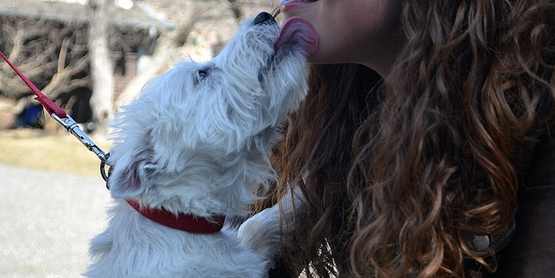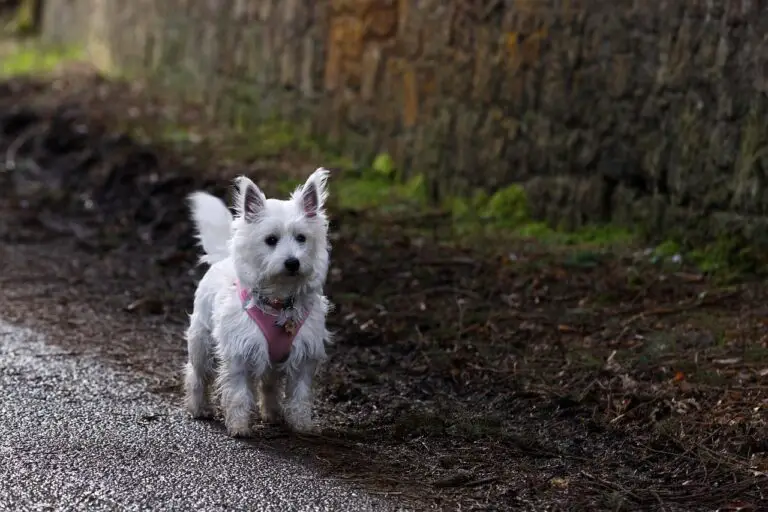Why westies are the worst? Westie behavior problems!

West Highland White Terriers known as Westies are drastically losing popularity in recent years, this playful, surprisingly sturdy, and great family dog has been labeled hard to train (mental stimulation, and independence), a lot of work (grooming, and exercising), and expensive to maintain (frequent health issues), but is it fair and is there any truth to this?
Let’s take a look at the westie behavior problems and the potential causes that would explain why westies are the worst according to some dog owners.
Health issues

Westies like all dog breeds are susceptible to several health issues, these illnesses will differ widely from one breed to another, and some breeds are more exposed than others.
Westies, in general, are healthy dogs if you get yours from a reputable breeder that screens his stock for potential health conditions and does the recommended tests for the breed.
According to the Official Breed Club Health Club Statement, westies are prone to the eye, patella, and hip conditions, and approximately 10% of all westies suffer from one of these conditions.
Another study the largest ever conducted on westies by the Canine Medicine and Genetics shows that :
Dental disease (which affects 15.7% of Westies), ear disease (10.6%), overgrown nails (7.2%), allergic skin disorder (6.5%), and obesity (6.1%) are the most common disorders.
However, Lower respiratory tract disease and cancer were the most common cause of death, with each accounting for 10.2% of deaths in the breed. Spinal cord disorders were the next biggest killer at 7.8%.
Royal Veterinary College
Frequent Hip Evaluation, Patella Evaluation, and Ophthalmologist Evaluation are necessary, along with general health check-ups, that’s why some dog owners insist that westies are expensive to maintain and have frequent health issues.
Aggression
Westies as a dog breed are generally not very friendly towards other dogs, and in most cases will be the ones that will pick up fights with sometimes much larger dogs.
Bred to hunt rats and other underground rodents, Westies will chase after anything that moves, hence the aggression stereotype.
Statistically, Westies as a breed do not raise profound public concerns over aggressive behavior, early socialization will help contrôle the ratting terrier behavior.
The word aggression is overly misused and the number one reason why dogs are turned into shelters, we need to understand that puppies cannot be aggressive unless there is something physically wrong with them.
All puppies are naturally mouthy and that’s their only mean of communication and they need to learn bite inhibition (aka soft mouth) which is the contrôle of the strength of their bite.
The same thing for nice family dogs like the westies, most cases of aggressive behavior are trained or conditioned into them or are reactive.
Training difficulty
Westies have for a long time been falsely labeled hard to train, along with any independent dog breed that needs to be stimulated.
Training a westie can be challenging, it’s their independence that makes the task difficult for new dog owners and inexperienced trainers.
Westies are intelligent, they were bred to think fast and act on the spot, so they are not the type of dog that will sit down and wait for you to give a command.
Training needs to be interactive, westies need to make a sense of what they have to do, but with patience and time they will train nicely.
Shedding
Popular belief is that dogs with longer hair have high shedding, but that’s not the case, shedding level has nothing to do with the hair length.
Westies shedding level is quite moderate, they do not trigger any allergies and don’t need consistent vacuuming and lint-rolling.
The shedding could get worst if the westie’s all-white double coat is not groomed and taken care of properly.
Grooming

This point is actually true, the West Highland White Terriers do actually need frequent grooming and regular visits to the groomer.
The westie’s all-white double coat is really hard to the touch and it’s not as soft nor fluffy as it might appear, frequent grooming is in fact necessary to keep them looking their best.
Daily brushing with a hairbrush for long and thick hair is really important to keep your westie’s coat clean and skin healthy, which will help reduce shedding.
Overgrown nails are also a very common situation with westies so regular clipping is important, and it is best for a dog like a westie to schedule a visit to a professional groomer for better results.
Grooming expenses for westies, when compared to other breeds, could be higher, but it levels up in other aspects like food and vet visits.
Protective nature
Westies are by nature great watchdogs, they are always vigilant and will react to any potential threat, whether it’s the mailman or a squirrel outside the window.
Protective nature is what having a dog is all about, overprotective behavior is on the other hand frustrating.
Westies have never been tied to overprotective behavior, in fact, all protective breeds are susceptible to this behavioral anomaly.
Early socialization and good training are keys to preventing dogs from turning overprotective, and dogs that have a strong relationship with one particular person are especially vulnerable.
With the early signs of overprotective behavior (dog gets between you and other people or animals, growl when someone is close…), the dog owner should act or seek the help of a professional, but again this is not a condition that is specific to West Highland White Terriers.
Energy and exercise

Playful and energetic are the main personality traits of the westie, they are not the breed of dog someone, who’s lazy and not home all day should have.
Westies require a lot of play sessions and exercise, a walk around the block will not cut it, for this small yet sturdy dog.
The westie is of the working group of dogs that needs to be doing something or have a job, that’s why they enjoy being around children.
They do chase anything that moves, so they perform best in fenced areas or on a leash, and they excel in a variety of canine sports and activities.
Active pet owners find that the westies are the best companions, they make a lovely hicking or running (on a leash) partner.
The small size and furry look of the westie can be misleading, they can indeed be too energetic for some introvert owners.
Vocal
Westies are indeed a very vocal breed, they bark quite often and howl, they express themselves with sounds, but they are not a yappy breed and will not bark for no reason.
A yappy westie is an abnormal dog that was trained/conditioned into this especially with the protective instinct.
Being vocal does not mean barking all the time, westies use other sounds to communicate and express themselves.
To be fair though, westies are vocal dogs that bark often, and it will take some time and patience to train them not to.
Stimulation
Westies are a working breed, they need to have a job to thrive, however, companionship is what most owners are looking for, mental games are the way to compensate for that.
Westies do best when challenged, puzzle toys like the Kong when filled with treats, and other mental challenges are great for them.
Tunnel games and hidden treats are all great activities for westies, these are not necessarily time-consuming for the owners.
All-in-all, westies do need mental stimulation and require the owner to give them attention and time along with daily exercises.
Westie behavior problems
As with any dog breed, Westies may experience behavior problems. Here are some common Westie behavior problems and tips on how to address them:
- Barking: Westies are known for their alert and vocal nature, which can lead to excessive barking. To address this issue, you can train your Westie to be quiet on command using positive reinforcement techniques, such as rewarding them when they stop barking when told to do so. Additionally, providing enough physical and mental stimulation for your Westie can help reduce their urge to bark out of boredom or frustration.
- Aggression: Some Westies may exhibit aggression towards people or other dogs. It’s important to address this behavior early on to prevent it from becoming a bigger problem. Working with a professional dog trainer or behaviorist can be helpful in identifying the underlying causes of the aggression and developing a behavior modification plan. This may involve desensitization and counter-conditioning techniques to help your Westie become more comfortable in certain situations.
- Separation anxiety: Westies can be prone to separation anxiety, which may result in destructive behavior when left alone. Gradual desensitization and counter-conditioning techniques, along with providing mental enrichment toys and creating a positive environment for your Westie when you’re away, can help alleviate separation anxiety. Medication may also be prescribed by a veterinarian in severe cases.
- House-training issues: Westies, like other dogs, may struggle with house-training. Consistent and positive reinforcement-based training, along with establishing a regular schedule for potty breaks, can help your Westie learn appropriate elimination behaviors. Avoid punishing your Westie for accidents, as it can create fear and anxiety around potty training.
- Digging: Westies have a natural instinct to dig, and this behavior can sometimes become problematic if they start digging in inappropriate areas, such as your garden or yard. Providing your Westie with designated digging areas, such as a sandbox or designated area in your yard, along with redirecting their digging behavior to those areas and rewarding them for using them, can help curb unwanted digging.
It’s important to remember that addressing behavior problems in Westies, or any other breed, requires patience, consistency, and positive reinforcement techniques. If you’re struggling with Westie behavior problems, seeking guidance from a professional dog trainer or behaviorist can be beneficial.
Always approach behavior problems with kindness and understanding, and avoid using punishment or harsh training methods, as they can worsen the problem or cause fear and anxiety in your Westie.
So are westies really the worst?
Westies need time and patience for training and daily activities, they also require frequent grooming and can be vocal, but they are excellent sturdy entertaining dogs for owners that will enjoy energetic small terriers.
Westies are by far not the worst dogs to have, they are certainly not for everyone, and do need attention and daily challenges to thrive, but they make excellent watchdogs, they’re fantastic with children, and are excellent partners for active owners.






